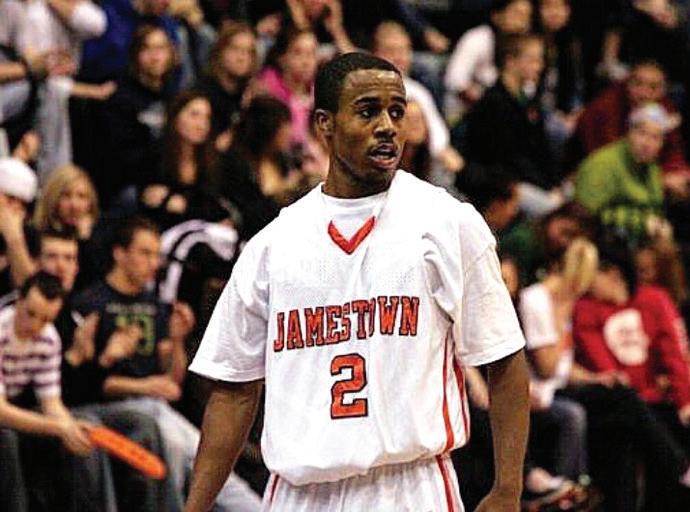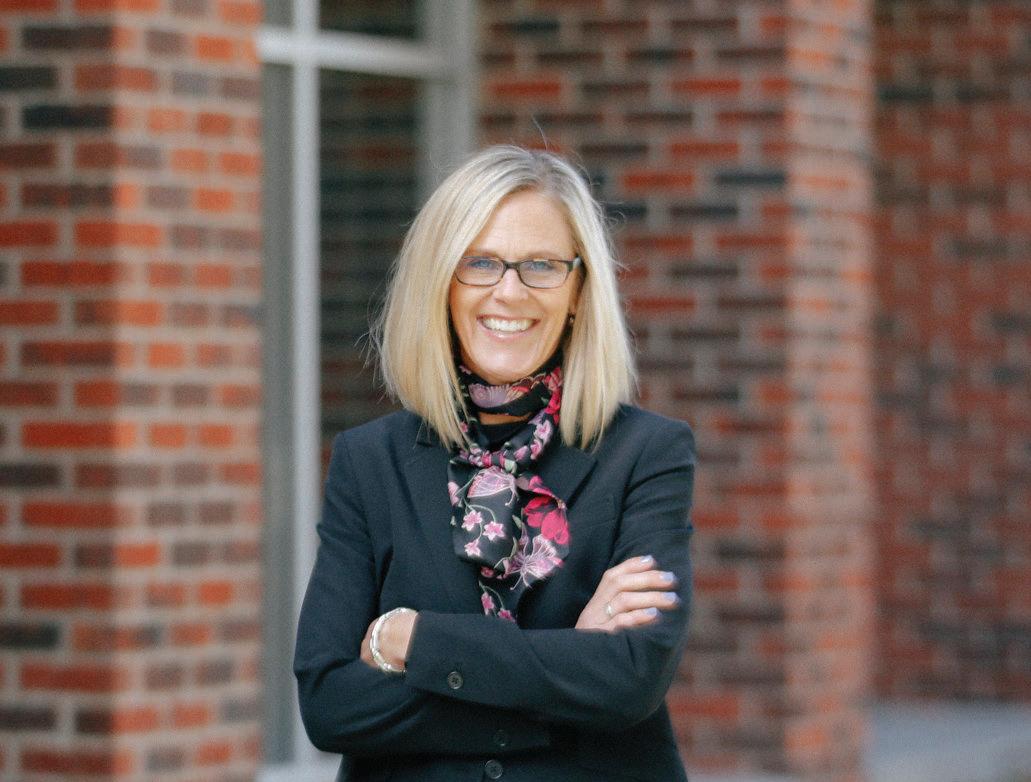
9 minute read
Listening. Learning. Growing
A ROUNDTABLE ON RACIAL INJUSTICE
Recently, six individuals sat down to discuss inequality and the systematic challenges that face minorities in the United States—specifically in Jamestown. Overall, the participants explained that they have had a very positive experience at the University of Jamestown, saying that they were met with love and kindness. But, everyone agreed, there is still room for growth.
Advertisement
PARTICIPANTS
Throughout the discussion, Dr. Polly Peterson often paused to remark on the valuable takeaways she was hearing from staff and alumni. One theme continued to rise to the forefront: there needs to be a change. A change in human perception. This change will be challenging, one met with hurdles. But, it is a change that the leaders at UJ have boldly stated they care deeply about as lifelong learners committed to servant leadership.

Gabrielle Brown
UJ Assistant Track and Field Coach | Graduate student | From St. Paul, MN
“I definitely feel like from my peers, that I am super supported here, but I think there’s room for growth, and I’m excited to be a part of that.”

Terrell Alfred (’20)
Basketball Trainer | Originally from St. Lucia, Grew up in New York City, Now resides in Orlando, FL
“Everyone’s always asking me, ‘Where’d you go?’ I tell them, ‘University of Jamestown,’ with confidence.”

Byron Jones (’12)
Facility Director | From Glenallen, MD
“I’m excited to be here to possibly help make a change and get people informed.”

Janay Morton
UJ Assistant Women’s Basketball Coach | From Minneapolis, MN
“My experience at UJ has been positive. But I think there’s more we can do to make people feel
Dr. Polly Peterson (’89)
UJ President | From Northwood, ND

“Getting to know every single student has been comfortable.”
We need to open their hearts, open their minds. It’s ok if it’s different. the joy of my life.”
Brett Moser (X’03)
UJ Vice President for Development and Alumni Relations | From Leeds, ND

“We want to have a teachable spirit. We want to listen, learn, grow.”
Dr. Peterson opened the conversation by thanking all of the participants for their openness, explaining that their conversation would help ensure that the University honors their claims as they move into the fall semester and beyond.
Dr. Peterson explained, “One of the things you hear from me constantly is the mission of this University. I say that to families, and I don’t want to be not telling the truth.” She continued, “It’s important to me that when we’re having this conversation, that I understand that we are following through on our commitment to support all students and to care for them as family—to provide opportunities, equal opportunities, for academic excellence, cocurricular engagement, and Christian experience. If we aren’t doing that, I want to know. If the community’s not doing that, I want to know.”
Q: What is it like for a minority culture to enter a majority culture?
What followed was an open discussion led by VP Moser about race is that sometimes we feel like we have to speak or act a certain way on the just doesn’t feel right. Like you have to change who you are. Why is that
and how it pertains to University of Jamestown and the surrounding community as a whole.
Q: What was your experience at UJ? What areas can we grow in?
Byron: One thing we probably could improve, is being open to different personalities and backgrounds. I have a huge personality. When I first [on campus]. We need 90% of you to change your mindset, so the 10%
came to Jamestown, I would walk into the lunch room and people would stare. I want to be myself, regardless. And eventually it turned from confusion, not hate, into love.
Terrell: I feel like a lot of our students, our black students or minority students, they come here and they feel like they can’t be themselves It’s just a learning curve. I’ve never been met with malice in Jamestown, especially with my teammates who always have my back.
Byron: Yeah, I do feel if I wasn’t a sports player, it would have been harder for me. I may have felt more isolated. I believe I gained a lot of friends because of sports, and it rolled over into the community. Janay: I think the most important part is to educate on diversity as a whole. Maybe freshman orientation or jamboree days. It’s hard if you have a kid in small-town North Dakota, and [minority stereotypes] are all they see on T.V., then subliminally, that’s all they’re going to believe.
Gabrielle: I’ve felt nothing but love and support being here. One thing I will say, this February, it really hit home for me the lack of support staff gets when there was no black history recognition at all. I knew it wasn’t that people didn’t want to learn anything, it’s just probably never been brought forth. I genuinely think there is a lot of room for growth, but the black and brown people here do get tired of having to be the educators, so it’d be great if the University took more of that on.
Brett: Currently at UJ, our numbers are around 90% [of students] are white/Caucasian and 10% are minority. And one of the things Byron said initial part of a relationship to gain acceptability, and part of that for me how it is? And how can we grow in our openness to that?
Janay: I think it’s the standard in America—white is the standard, so anything that branches off from that is said to be “different”. And that’s part of the problem. We’re trying to change 90% of the population’s mind initially. They feel like they have to mix in and conform to the way of life.
will feel comfortable and accepted to learn. But it’s something that needs to be done.
Gabrielle: I just think of it like survival. When I’m here, I’m very intentional with how I navigate space. I’m very intentional with how I’m carrying myself. Even if it’s something as simple as going to Walmart, I’m planning, ‘Ok, when are the least amount of people going to be there so I can avoid all the stares.’ (continue on pg. 14)
(continue from pg. 13)
Terrel: I feel like it’s a lot of media presence that has to deal with how we are perceived. You see a lot of wild things happening in black communities. Coming up [to Jamestown], I felt like I really had to watch what I said. It’s more of having a sense of control when you’re going into a majority population as a minority.
Byron: My perspective is a little different. I think that change can’t happen, especially as minorities, unless we continue to be ourselves. But I would say as a University, we need to make kids feel more comfortable with being able to be themselves.
Janay: It’s tough because as a minority, you get to white spaces and you learn how to navigate that. But, I think hearing what Byron said was good for me, too. When you’re in those spaces, be completely yourself. If I’m not myself, we’re doing a disservice to white people learning how to navigate our space.
Brett: I think just talking about the system, the systematic racism, that’s in place helps us navigate that, so I thank you all for engaging like that.
Q: What are your hopes or wishes for white faculty members, staff, and white students at UJ? What are some of the things they should know to pursue meaningful relationships with the entire community of Jamestown?
Polly: We all bring to the world differences. Big personalities, little personalities. Different backgrounds, different desires, we all come with our own self. How do we become more open to differences in self? I think there’s so much room here for education in general in how we respect one another. But, that is not to take away from the issue at hand today which is, how do we make sure that we understand that the are systemic rules and attitudes in place surrounding the African American community right now?
Gabrielle: I think once we realize that we all have our unconscious biases, regardless of the color of your skin, your background, socioeconomic status—we all have them and we need to learn to check them. I have to do it, too. The world we live in here [in Jamestown] is so different than in the cities. But ignorance isn’t an excuse. You know, there isn’t a reason why our schools, our younger schools, only teach white history.
Brett: That’s good for us to know as an institution of higher education… are we balanced in what we teach?
Gabrielle: When I think about higher education, I think people are paying to be uncomfortable to learn. So, I think it’s ok to learn the status quo of whiteness and white fragility, and what not. There shouldn’t be just one day where we’re acknowledging the non-white students, and then say, ‘Let’s go back to normal,’ which means let’s go back to whiteness. It should be routine, where you are constantly challenged. And to know it’s ok to disagree and have different views.
Polly: That’s what I’m trying to get to. It’s not a day. It’s not just a course. It’s a culture. We’re in this together. We’re a family. We’re all going to learn. It’s not going to be perfect. But, we’re going to love each other for our differences. Gabrielle: Absolutely. It’s so important to learn history across all perspectives, so then we don’t have black kids who are only taught to react instead of respond when they are asked questions. I wish it happened before college, even with really little kids.
Polly: The best news is, my favorite part of higher education, we get to change people’s perception when they are 17, 18 and 19 – the most influential years of their lives. If you come here with an open mind, you get to really learn what’s true to you.
Dr. Peterson and VP Moser closed the discussion by again thanking the participants for their input. Dr. Peterson said, “There is a real opportunity here for us to make students feel like this is the best four years of their lives. It matters to us that you have a great experience. And, because of your time here, something special will happen to you after you leave—in your career, in the civic world you engage in. The big takeaway for me is that there’s room here for us to make it better.”
Key takeaways
Start small: Start with any major history that you know—Fourth of July, Christmas—and find out what that holiday means to a different culture. Always aim to be culturally competent: Intentionally see a person for who they are. How can we welcome new students? How can we support different religious beliefs?
Educate, educate, educate:
Add more classes that teach about different cultures to help provide safe spaces for students to ask questions and grow in their thinking.
Embrace differences:
It’s not always about the color of skin. Individuals need to be open to differences, not just tolerant of them.
Create minority outlets:
Whether it’s a group on campus or a designated advisor, there needs to be a possibility for minority students to feel comfortable talking openly.




